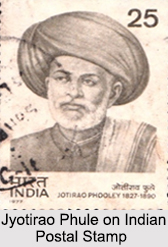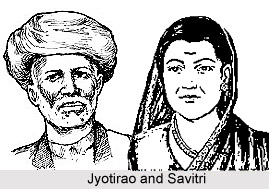Introduction
 Jyotirao Govindrao Phule, more popularly known as "Jyotirao Phule", was a thinker, activist, social reformer, writer, philosopher, theologist, scholar and editor. He was also called "Mahatma Jyotiba Phule". Phule and his wife, Savitribai Phule were pioneers of women"s education in India. His great contribution was prominent in the field of education, agriculture, caste system, women and widow upliftment and removal of untouchability. He is very popular for his efforts to educate women of the lower caste as well as the masses. Jyotirao Phule died on 28th November, 1890.
Jyotirao Govindrao Phule, more popularly known as "Jyotirao Phule", was a thinker, activist, social reformer, writer, philosopher, theologist, scholar and editor. He was also called "Mahatma Jyotiba Phule". Phule and his wife, Savitribai Phule were pioneers of women"s education in India. His great contribution was prominent in the field of education, agriculture, caste system, women and widow upliftment and removal of untouchability. He is very popular for his efforts to educate women of the lower caste as well as the masses. Jyotirao Phule died on 28th November, 1890.
>Early Life of Jyotirao Phule
Jyotirao Phule was born on 11th April, 1827 in Katgun, a village in Satara district of Maharashtra. His father Govindrao worked as a vegetable vendor and his family belonged to the "Mali" caste, considered inferior to the Brahmins. He attended primary school but left his studies to work in the farms. However, his neighbours who recognized the child"s intelligence convinced his father to let him continue his education. He got married to Savitribai at an early age of 13. Jyotirao Phule went to the local Scottish Mission"s High School and passed out in 1847.
Satya Shodhak Samaj by Jyotirao Phule
On 24th September 1873, Jyotirao Phule formed Satya Shodhak Samaj (Society of Seekers of Truth) with the objective of liberating the Sudras to prevent their "exploitation" by Brahmins. He was the first president and treasurer of Satya Shodhak Samaj.
Phule, through the organization refused to regard the Vedas as sacrosanct. He also opposed the idea and even rejected the Caste system. This organization also propounded the spread of rational thinking and refused the need for Brahmin priestly class as educational and religious leaders. He was also against those particular Brahmins who were using religion and blind faith of masses for their own monetary gains. After Jyotirao Phule"s death his followers continued the Samaj campaign to the remotest parts of Maharashtra.
Jyotirao Phule as Founder of Satyashodhak Samaj
Jyotirao Phule as the founder of Satya Shodhak Samaj has worked towards the welfare of women. When he actually set up the Satya Shodhak Samaj, his wife - Savitribai Phule became the head of the women`s section which included ninety female members, added to that she also worked tirelessly as a school teacher for girls.
Deenbandhu publication which happens to be the mouthpiece of Satya Shodhak Samaj also played a major role in the movement. After his death, the movement did not stop, as his spirited followers continued with the movement to the remotest part of Indian state of Maharashtra. The ruler of Kholapur princely state - Shahu Maharaj, provided a lot of moral and financial support to Satya Shodhak Samaj. In its newly formed avatar, the party carried on the work of superstition removal vigorously. Many times it degenerated in hate sprouting against Brahmins as a caste.
Jyotirao strongly believed that promotion of equality, brotherhood, human dignity, economic justice and value devoid of exploitation is essential towards new social system. He vehemently attacked the concept of blind faith for society and religion. He criticized the misleading myths that circled the mind of women, shudras and ati-shudras. Yielding to fate or all mighty, astrology, numerology and other such rituals, sacredness, god-men, etc. was considered irrational and silly.
Jyotirao also subjected the sacred texts and religious behaviour to test rationalism. He also characterized his faith as outwardly religious but in spirit politically motivated movements. He also seriously accused them of uploading the teachings of religions and also refusing to rationally analyse religious teachings.
Jyotirao Phule firmly believed in overthrowing the social system where man has been consciously made dependent on others, illiterate, ignorant and poor, with a view to exploiting him. According to Phule, blind faith and eradicating of the same formed the prime agenda for broader socio-economic exploitation. Mere advice, education and alternative ways of living are not enough, unless the economic framework of exploitation comes to an end.
Contribution of Jyotirao Phule for Women
After educating his wife, Jyotirao Phule opened a school for girls in India in August 1948. This was actually the second school for girls in India. He supported widow remarriage and started a home for upper caste widows in 1854. In the same year, he also started a home for new-born infants to prevent female infanticide.
Occupation of Jyotirao Phule
 Apart from being a social activist, Phule was a businessman by profession. In 1882, he was doing business as a merchant, cultivator and municipal contractor. Jyotirao Phule also worked as a contractor for government where he supplied materials for the construction of a dam near Mula-Mutha River. He had 60 acres of farmland at Manjri near Pune. In the year 1876, he was appointed as municipal council member and he served in this position till the year 1883.
Apart from being a social activist, Phule was a businessman by profession. In 1882, he was doing business as a merchant, cultivator and municipal contractor. Jyotirao Phule also worked as a contractor for government where he supplied materials for the construction of a dam near Mula-Mutha River. He had 60 acres of farmland at Manjri near Pune. In the year 1876, he was appointed as municipal council member and he served in this position till the year 1883.
Published Works of Jyotirao Phule
The notable works of Jyotirao Phule, which have been published, are:
Tritiya Ratna, 1855
Brahmananche Kasab,1869
Powada : Chatrapati Shivajiraje Bhosle Yancha, June 1869
Powada: Vidyakhatyatil Brahman Pantoji, June 1869
Manav Mahammand (Muhammad) (Abhang)
Gulamgiri, 1873
Shetkarayacha Aasud (Cultivator`s Whipcord), July 1881
Satsar Ank 1, June 1885
Satsar Ank 2, October 1885
Ishara, October 1885
Gramjoshya sambhandi jahir kabhar, (1886)
Satyashodhak Samajokt Mangalashtakasah Sarva Puja-vidhi, 1887
Sarvajanik Satya Dharma Poostak, April 1889
Sarvajanic Satya Dharmapustak, 1891
Akhandadi Kavyarachana
Asprashyanchi Kaifiyat
Recognitions to Jyotirao Phule
Jyotirao Phule had devoted his 40 years of life to social service fighting for the rights of the "bahujans". To mark this accomplishment, the bahujans, Satyashodhak leaders and workers decided to felicitate Jyotirao Phule. Hence on 11th May 1888, he was honoured with the title of "Mahatma" by another social reformer from Mumbai, Rao Bahadur Vithalrao Krishnaji Vandekar. Some biographical books have also been written on Jyotirao Phule"s life. Some statues have been constructed and some places have been named after him to commemorate his contributions towards Indian society. In 1977, government of India introduced postal stamp in the name of Jyotirao Phule.
Religious Thinking of Jyotirao Phule
Religious thinking of Jyotirao Phule was mainly based on the Hindu gods and mythology. He basically belonged to the Indian aboriginals. His akhandas were also based on the adhangs of Indian aboriginals saint named Tukaram (a Moray Shudra.). Phule`s own idol or hero was Chhatrapati Shivaji and referred to him as "destroyer of the Brahmins.
He was also a subscriber to Maharishi Vitthal Ramji Shinde`s magazine - Dnyanodaya. (Maharishi Shinde was a Harijan or "untouchable" and a member of the reformist Prarthana Samaj.)
He did not like the castists of Tamil Nadu using Lord Rama as a symbol of oppression of Aryan conquest.
Attack on the Sanctity of Vedas
The critics of Jyotirao Phule lambasted him on the issue of caste system with the attack on the Vedas - the most fundamental texts of forward-caste Hindus. He considered Vedas as `idle fantasies` as `palpably absurd legends`. He considered Vedas a `form of false consciousness`.
He believed that the true inhabitants of Bharat are the Astik. He also believed that the Brahmins were outsiders to Hinduism. This was also the view spoken by Keshavarao Jehde.
Social Activism by Jyotirao Phule
 Social activism by Jyotirao Phule actually helped bring in a change in Indian social and political structure. Right through the struggle in his social activism, he was ably supported by his wife, Savitribai Phule. Together, the couple started a school for girls in India in the year 1848. For this purpose he was forced to leave his home.
Social activism by Jyotirao Phule actually helped bring in a change in Indian social and political structure. Right through the struggle in his social activism, he was ably supported by his wife, Savitribai Phule. Together, the couple started a school for girls in India in the year 1848. For this purpose he was forced to leave his home.
He was the person who actually initiated the concept of widow remarriage and was ably supported and encouraged by his wife Savitribai Phule. The couple worked towards setting up second school for girls in India in the year 1848 where he was also forced to leave his home. He was the person who started the process of widow remarriage and also established a home for widows belonging to the upper class in 1854, and also home for newly born infants to prevent female infanticide. Phule also tried to get rid of the scar of social untouchability that was surrounding the upper caste people.
He did set up the Satya Shodhak Samaj (Society of Seekers of Truth) on September 24, 1873, a group whose main aim was to liberate the social Shudra and Untouchables castes from exploitation and oppression. He was also a member of the Pune municipality from 1876 to 1882.
Jyotirao Phule`s Connection with Women Activists
Some of the well-known and first modern contemporary feminists were very close to Phule which included his wife Savitribai Phule, Pandita Ramabai, a Brahmin woman. The latter was one of the prominent names in that period - she was an advocate for the rights and welfare for the women in modern India; Tarabai Shinde, the non-Brahmin author of a fiery tract on gender inequality which was largely ignored at the time but has recently become well-known; and Muktabai, a fourteen-year-old pupil in Phule`s school, whose essay on the social oppression of the Mang and Mahar castes is also now famous.
He started "Shiv Jayanti"(Birth day of Chhatrapati Shivaji Maharaj) first time in India. He also played an active role towards discovery of the "Samadhi" of Chhatrapati Shivaji Maharaj on Raigad Fort which had disappeared in creepers and climbers. He wrote "Shivajicha Powada" an epic poem.




















